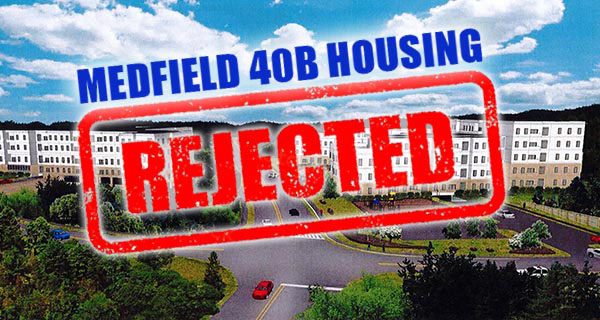[ccfic caption-text format="plaintext"]
By Stephen Press
Hometown Weekly Staff
In Medfield, opponents of the proposed Medfield Meadows Chapter 40B development are celebrating a major victory as the Massachusetts Housing Finance Agency (MassHousing) denied the project’s application. Medfield Meadows LLC was notified of the denial in a letter on Tuesday, Jan. 31.
This recent development comes in the wake of Medfield Meadows’ Jan. 5 submission to MassHousing of a revised proposal. The proposal’s revisions had reduced the height and density of the development, in addition to further aesthetic modifications.
Chapter 40B is a state statute applying to municipalities in which under 10 percent of housing qualifies as affordable. The statute enables local Zoning Boards of Appeals to approve affordable housing developments under flexible rules if at least 20-25 percent of the units have long-term affordability restrictions.
In a letter addressed to John Kelly, Principal of Medfield Meadows LLC, MassHousing noted that the project’s lack of consistency with Medfield had ultimately doomed the proposal.
Firstly, MassHousing noted that the Medfield Meadows buildings themselves were “inconsistent with nearby existing residential building typology.” The state agency specifically focused on the back portion of the proposed north parcel of land - which would abut Joseph Pace Road, John Crowder Road, and Dale Street - as being particularly impactful.
The agency was also quick to point out that the height, mass and scale of the proposed developments were impediments to approval. “The building massing in the original submission was entirely inappropriate for both the Site and its relationship to the adjacent residential neighborhood,” wrote MassHousing. “While the revised site plan, particularly that of the north parcel, has addressed some of the most glaring impacts to its closest abutters, the overall perception of the massing has not been adequately reduced to make the findings required under the regulations.” The south parcel of land, according to the letter, was deemed “not significantly improved by the revised site plans,” with the presence of wetlands on the site providing a major impediment to “a more logical relationship to the Grove Street neighborhood.”
The density of the project was also identified as an important factor in denying the proposal, as MassHousing deemed the Medfield Meadows development “simply too dense for the lot on which it is located.” The agency added that “While there are no maximum density thresholds, it is advisable to develop at a density that takes some cues from the existing community context.” The Parc at Medfield, the nearest rental development in the area, has a density of roughly 10 units per acre. Medfield Meadows, MassHousing pointed out, would have a density of close to 30 units per acre.
Finally, the agency focused on the aesthetics of the development as they related to the surrounding streetscape. “The northern and southern building facades face Route 27,” noted MassHousing, “which is the principal access to downtown Medfield, and create a poor visual relationship to this adjacent roadway.”
“While it is expected that a Project proposal submitted in accordance with the zoning and regulatory relief available under Chapter 40B will differ from the surrounding context in many fundamental ways,” read MassHousing’s letter to Medfield Meadows, “the Subsidizing Agency must also address matters regarding the Project’s relationship to existing development patterns in the surrounding area … MassHousing has determined that the conceptual project design for the proposed development is not appropriate for this Site.”
While MassHousing’s decision has rejected the development of the specific Medfield Meadows proposal, Medfield will still remain susceptible to further 40B proposals until it meets the state-mandated 10 percent affordable housing threshold. At the moment, the Department of Housing and Community Development has indicated that only 6.71 percent of Medfield’s residences qualify as such.


























